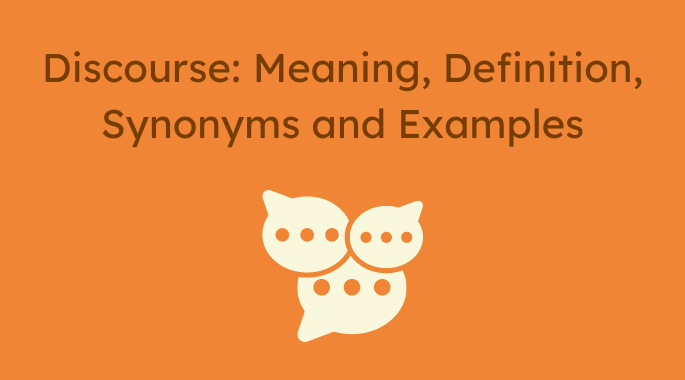
The term ‘discourse’ is frequently encountered in conversations about language, communication, and social interactions. But what does it truly encompass? This blog post aims to demystify ‘discourse,’ providing a clear definition, exploring its synonyms, and illustrating its application through real-world examples.
1. The Meaning of Discourse
At its core, it is about written or spoken communication. It transcends individual words or sentences, focusing instead on larger units of language as they function in various contexts. It isn’t just about what is being communicated; it’s also about how, why, and under what circumstances the communication occurs.
2. Defining Discourse in Linguistics
In linguistics, discourse is understood as a sequence of sentences woven together in a coherent and meaningful way, often to convey a message or share information. It’s not confined to the structure of language but extends to its use in social and cultural contexts.
3. Synonyms for Discourse
Several terms are closely related to or used interchangeably with it. These include:
- Dialogue: A conversation between two or more people.
- Narrative: A structured account of connected events.
- Communication: The act of conveying meanings from one entity or group to another.
- Discussion: An interactive exchange of ideas or opinions.
- Talk: A more casual synonym, often referring to informal conversation.
4. Examples of Discourse
- Political Speeches: Political speeches are classic examples of it where language is used persuasively to convey ideologies and convince audiences.
- Academic Lectures: These are structured forms of it designed to educate and inform students about specific topics.
- Social Media Interactions: Social media platforms are modern arenas of it, where people communicate through posts, comments, and messages.
- News Reports: Journalism uses it to report and analyze current events, providing context and different perspectives.
5. Conclusion
Discourse is a foundational element of human interaction. It’s through discourse that we express ourselves, connect with others, and navigate the complexities of society. Whether in spoken or written form, understanding it allows us to appreciate the depth and breadth of communication. It’s a lens through which we can view language not just as a tool, but as a living, evolving entity that shapes and is shaped by our collective experiences.
6. Final Thoughts
As we continue to explore and understand the various dimensions of discourse, it becomes evident that it’s more than just a linguistic concept. It’s a reflection of our culture, thoughts, and the very essence of human interaction. By analyzing it, we get a clearer picture of how language functions in our daily lives, making us more effective communicators and better listeners in this interconnected world.
7. Frequently Asked Questions (FAQs)
- What is the basic meaning of discourse?
- It refers to written or spoken communication. In a broader sense, it encompasses any form of communication including gestures, written texts, and spoken words, where ideas, information, and beliefs are exchanged.
- How is it defined in linguistics?
- In linguistics, it is defined as a coherent and structured group of sentences, spoken or written, that work together to convey a complete thought or idea. It goes beyond grammar and syntax, focusing on the context and interaction of language.
- Can you give synonyms for discourse?
- Yes, some synonyms for it include dialogue, conversation, communication, discussion, and monologue. Each carries a slightly different connotation but broadly relates to the exchange of information and ideas.
- What are some examples of it in everyday life?
- Examples include:
- A conversation between friends.
- A news broadcast.
- Social media threads or comments.
- Academic lectures or seminars.
- Political debates and speeches.
- Examples include:
- Is discourse always verbal?
- No, it can also be non-verbal. It includes body language, written texts, symbols, and other forms of non-verbal communication that contribute to the conveyance of meaning.
- How does discourse differ from mere conversation?
- While conversation is a type of discourse, not all it is a conversation. It encompasses a wider range of communicative acts, including one-sided speeches or written texts, which might not involve direct interaction like a conversation does.
- Why is studying it important?
- Studying it helps in understanding how language is used in context to convey meaning, reveal social norms, and influence thoughts and behaviors. It’s crucial in fields like linguistics, sociology, psychology, and communication studies.
- How does discourse analysis work?
- It analysis involves examining language use in context, looking at factors like language choice, tone, audience, purpose, and cultural norms to understand how and why certain meanings are conveyed.
- Can discourse change over time?
- Absolutely. It evolves with changes in societal norms, cultural contexts, and technological advancements. What is considered appropriate or effective discourse in one era may change in another.
- Is there a difference between formal and informal discourse?
- Yes, formal one is structured, often follows established conventions, and is found in settings like academia or official communications. Informal one is more relaxed, used in everyday conversations, and can include colloquial language.
Read a a full list of grammar topics for better understanding of English grammar.